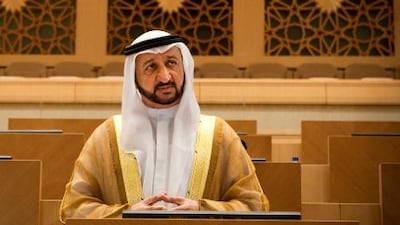Abu Dhabi // The government is close to completing a population strategy that may define an ideal demographic mix between Emiratis and expatriates in the UAE's population, according to the Minister of Interior.
In a letter to the Federal National Council, Sheikh Saif bin Zayed, the Deputy Prime Minister and Minister of Interior, who also heads the Federal Demographic Council, said a strategy to address the imbalance was nearly ready. It would be presented to the FNC when complete, he said.
His statement came in response to a question by Sultan Saqr al Suwaidi, a member from Dubai, on what proportion of the population should be Emirati under the government's 2021 strategy.
"The national strategy on the population make-up is in the final stages of approval by the top leadership," said the statement, which was read to the council.
"The FNC will be informed of the specific percentage that the government has to reach to fix the population imbalance."
A study by Tanmia, the employment and human resources authority, cited in documents released yesterday, projected that Emiratis made up 13.3 per cent of the population last year, down from 15.4 per cent in 2006 and 24.4 per cent in 1995.
According to Sultan al Muazzin, the chairman of the FNC's health, labour and social affairs committee, there are a little under 900,000 Emiratis. Estimates put the UAE's population last year at between 7.5 million and a little over 8 million, though the lack of a census in 2010 means more exact figures are unavailable.
The Federal Demographic Council is tasked with reviewing residency and labour policies in an attempt to create "demographic balance".
It was established in late 2009 but its strategy has yet to be announced, although Sheikh Saif's statement indicates that it is close to being approved by the Cabinet.
A document compiled by the FNC's general secretariat outlined a list of concerns about the effects of the population imbalance.
It noted a fear that long-term expatriates would eventually demand "political rights", although it did not elaborate on the nature of such demands.
"Definitely this is a potential concern that we need to think about," said Mr al Suwaidi after the session.
Expatriate services such as healthcare, subsidised utilities and infrastructure cost the country between Dh45bn and Dh55bn a year, more than a fifth of the total labour bill, the document noted.
It also said expatriates were partly to blame for Emirati unemployment. As the number of Emiratis entering the workforce rises, many find it difficult to get jobs in the private sector as they compete with a plentiful supply of expatriate labour. "The unlimited flow of foreign labour will reduce job opportunities for nationals, especially in the private sector," the council said. In 2009, just 69,000 of the 2.6 million private sector workers - 1.5 per cent - were Emirati.
In addition, 80 per cent of expatriate workers were unskilled, which went against the country's overall economic development strategy, the council said.
The diversity of the population - more than 200 nationalities are represented in the UAE - has had the effect of diluting local culture and national identity, it said.
Meanwhile, the FNC postponed another discussion on the country's laws on bounced cheques until its next session on February 8, because Hamad al Midfa, the FNC member who called for a review of the law, was not present yesterday.
However, the FNC did give its approval to a law regulating maritime shipping and industry.
The law prescribes life imprisonment for anyone who burns or sinks a ship or causes "massive damage" that endangers lives.
It also outlines ship mortgage, registration and insurance procedures, as well as liability in the event of a collision at sea.
The FNC's legislative committee said the law would "develop maritime legislation" and "ease and regulate maritime trade as well as protect the environment and the safety of ships and lives".
Sheikh Hamdan bin Mubarak, the Minister of Public Works, accepted the FNC's amendments to the law, which now has to be signed by the President.
kshaheen@thenational.ae

UAE to draft population strategy to address 'imbalance'
Concerns over the UAE's demographics take centre stage at Tuesday's FNC session.
Most popular today

